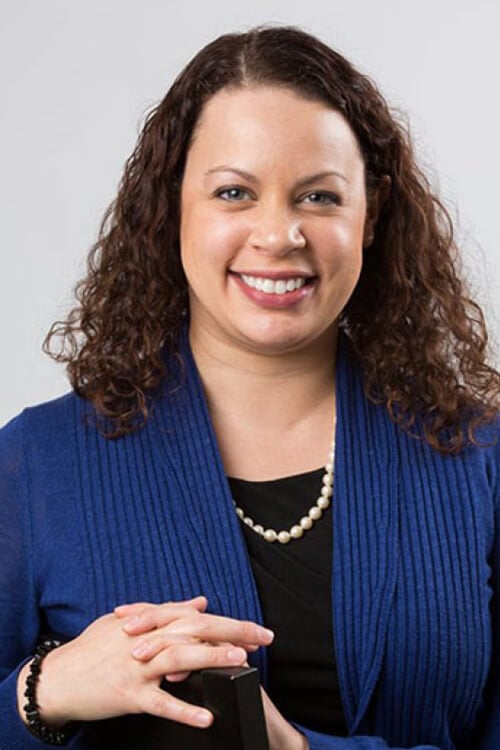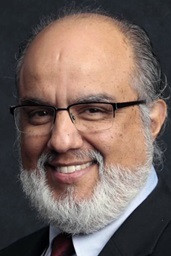Key points:
- The United Methodist General Conference approved an amendment to the denomination’s constitution last year that adds gender and ability as characteristics that do not bar church membership.
- To take effect, the amendment must be ratified by at least two-thirds of the total members voting this year at annual conferences around the globe.
- Voting “yes” on the amendment would make the denomination more welcoming, writes the Rev. April Casperson.

Courtesy of Otterbein University.
Commentaries
At last year’s General Conference, an important amendment to The United Methodist Constitution was passed. Paragraph 4, Article IV added “gender” and “ability” to the categories of persons who cannot be denied membership within a United Methodist church.
The addition of gender and ability matters. Often, congregations will say, “We welcome everyone!” But it can be easy to become complacent in being intentionally welcoming to all. Naming specific groups, demographics and dimensions of diversity helps us consider who might not be present in our churches and to be intentional about welcoming all.
Adding the word “ability” is a bold acknowledgement that the church is for all people. As I am continuing to learn about disability advocacy, I am thankful for the Disabilities Ministries Committee of The United Methodist Church and its resourcing for the connection.
It can be easy for churches to have preferences for new visitors and members who look and sound like the majority of the congregation. Think about someone you know who has physical and/or mental abilities that differ from yours. Can you think of a time when they were not fully welcomed into a community, a workplace, a school or even a family, simply because they were different?
The church exists to welcome all, not just the majority. Adding “ability” to Paragraph 4, Article IV makes our universal welcome even more clear for persons with differing abilities.
Adding the word “gender” may feel unnecessary, but we still have many spaces in our world where gender discrimination exists.
Women and men are part of God’s beloved community. The denomination uses expansive language to describe God, and all persons, regardless of gender, can serve in lay and clergy leadership throughout the church.
I am hopeful that 2025 will be the year when we pass ratification of Paragraph 4, Article IV. In 2016, we came very close. The addition of “gender” and “ability” passed at the General Conference level, but when individual voting members voted, we fell short of the two-thirds vote needed. The Rev. Leigh Goodrich provided a summary of 2016 voting. It is important to note that the number and configuration of the annual conferences listed differ from today’s United Methodist Church.
In conversations with people from annual conferences where most of the members voted “no” in 2016, we came to understand that there was concern that the topic could be related to human sexuality.
Amendment’s wording
If the amendment is ratified, Paragraph 4, Article IV would read as follows:
“All persons, without regard to race, gender, ability, color, national origin, status, or economic condition, shall be eligible to attend its worship services, participate in its programs, receive the sacraments, upon baptism be admitted as baptized members, and upon taking vows declaring the Christian faith, become professing members in any local church in the connection.”
It should be noted that this amendment has nothing to do with sexuality. In this amendment, the inclusion of gender simply means being male or female is no bar to United Methodist church membership.
Every lay and clergy voting member within every annual conference will have the opportunity to vote on this amendment. Ratification will be based upon the percentage of the total number of votes from across The United Methodist Church. Every vote will be counted.
When your annual conference moves into the voting session focused on the constitutional amendments from General Conference, Ratification Ballot #1 focuses on regionalization. Ratification Ballot #2 will be Paragraph 4, Article IV.
These amendments will be presented for possible discussion, but they cannot be amended or changed. Every individual vote will be counted, and the goal is to have at least two-thirds of all votes in favor of the amendment.
Some people have shared that they feel like Paragraph 4, Article IV doesn’t go far enough in listing groups that cannot be discriminated against and that it isn’t progressive enough. That is a fair concern, and we have to start where we are. When churches, denominations and organizations work on ensuring that all are welcome, they have to take steps towards their goal. Changes, like constitutional amendments, have to meet people where they are and help them take steps towards welcoming all people. The addition of ability and gender are a step in the right direction.
The United Methodist Church celebrates an open table. At the Holy Communion table, all are welcome, without regard to difference. Voting “yes” on Ballot #2 for Paragraph 4, Article IV is a way to ensure that there are no barriers to membership in The United Methodist Church.
Casperson is the director of Enrollment Management at Methodist Theological School in Ohio, a diversity, equity and inclusion consultant, and a deacon in the West Ohio Conference. She was a delegate at last year’s General Conference. She also is a board member of the United Methodist Commission on the Status and Role of Women, which submitted the amendment to General Conference.
News contact: Julie Dwyer or Heather Hahn at [email protected]. To read more United Methodist news,subscribe to the free UM News Digest


